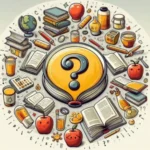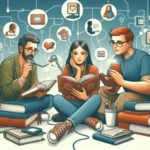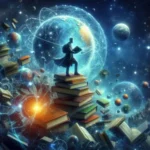In the vast universe of literature, where countless stories vie for our attention, some books shine brightly while others fade into obscurity, often leaving readers perplexed about their true worth.
What makes a book overrated or underrated? Is it the hype that surrounds a bestseller, or the hidden gems that quietly resonate with only a select few? In this blog post, we’ll embark on an enlightening journey through the literary scale, dissecting the most overrated and underrated books of all time. We’ll explore the cultural phenomena that have captured the masses and examine the hidden treasures that deserve a second glance. Whether you’re a seasoned bibliophile or a casual reader, join us as we unpack these literary classifications and invite you to reconsider what you think you know about these celebrated works and those that have been unjustly overlooked.
1. Introduction to the Literary Scale Concept
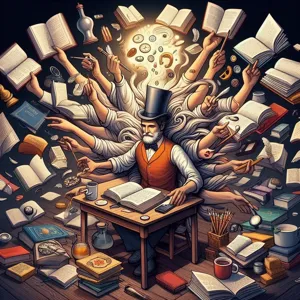
In the vast landscape of literature, the distinction between overrated and underrated books often sparks fervent debates among readers and critics alike. Enter the Literary Scale: a conceptual framework designed to evaluate the cultural significance, popularity, and merit of various literary works. This scale allows us to explore how certain books, despite their acclaim, may not live up to the hype, while others quietly resonate with readers, offering profound insights and unforgettable narratives that often go unnoticed.
Understanding the Literary Scale begins with an acknowledgment of the subjective nature of reading. What one person deems a masterpiece, another may view as pedestrian. Yet, this divergence in opinion is precisely what makes literature so rich and varied. The Literary Scale acts as a tool to navigate these waters, encouraging readers to question the prevailing narratives about popular titles while also shining a spotlight on hidden gems that deserve recognition.
In this post, we will delve into the complexities of this scale, examining classic examples that have been both exalted and overlooked throughout literary history. By unpacking the factors that contribute to a book’s status—be it its narrative style, thematic depth, or cultural impact—we can gain a deeper appreciation for the diverse spectrum of literature. So, whether you’re a die-hard bibliophile or a casual reader, join us as we embark on this enlightening journey through the literary world, exploring the peaks and valleys of the books that have shaped our reading experiences.
2. Criteria for Evaluation: What Makes a Book Overrated or Underrated?
When diving into the literary landscape to discern what makes a book overrated or underrated, it’s essential to establish a clear set of criteria for evaluation. This process not only helps in identifying the hidden gems among the commonly celebrated works but also sheds light on those titles that may have received more praise than they deserve.
**Cultural Impact:** One of the primary indicators of a book’s status is its cultural significance. Overrated books often dominate bestseller lists and receive extensive media coverage, leading to a collective hype that may overshadow the actual literary merit. Conversely, underrated books may possess profound insights or innovative storytelling techniques but remain largely overlooked due to a lack of marketing or societal interest at the time of their release.
**Quality of Writing:** The craftsmanship within a book plays a critical role in its evaluation. We assess the author’s ability to create vivid imagery, develop complex characters, and weave intricate plots. Overrated works may rely on popular tropes or sensationalism, while underrated books often showcase a subtlety and depth that resonate with readers in a more profound way.
**Reader Reception:** Public opinion can be a double-edged sword. A book that garners widespread acclaim may be celebrated for its accessibility or relatability, but this doesn’t always reflect its literary value. On the other hand, a work that captivates a niche audience may offer layers of meaning that elude the mainstream. By examining reader reviews, literary critiques, and academic discussions, we can gain insights into how different demographics perceive the book’s worth.
**Historical Context:** The era in which a book is published also influences its standing. A novel that pushes boundaries within its time may later be recognized as a classic, while others might fade into obscurity despite their groundbreaking themes. Understanding the historical significance can help us determine whether a book has been prematurely forgotten or unjustly exalted.
By applying these criteria—cultural impact, quality of writing, reader reception, and historical context—we can begin to unpack the complexities of literary valuation. This evaluation not only enriches our reading experience but also allows us to engage in meaningful discussions about the narratives that shape our literary world. In this exploration, we’ll uncover the stories that deserve their time in the spotlight and those that may have been elevated beyond their true merit.
3. The Most Overrated Books: A Closer Look

When discussing the most overrated books of all time, it’s crucial to differentiate between popularity and literary merit. These books often dominate bestseller lists and generate fervent fanfare, yet they frequently leave discerning readers feeling underwhelmed. One of the most cited contenders in this category is *The Alchemist* by Paulo Coelho. While its themes of personal legend and destiny resonate with many, critics argue that its simplistic prose and repetitive motifs do little to elevate the philosophical questions it poses. Similarly, *Fifty Shades of Grey* by E.L. James has captivated a massive audience, sparking conversations about sexuality and romance. However, its portrayal of relationships and writing style has led many to label it as a missed opportunity for deeper exploration of its complex themes.
Another book frequently mentioned in this regard is *The Catcher in the Rye* by J.D. Salinger. Though heralded as a classic of teenage angst and rebellion, some readers find Holden Caulfield’s incessant cynicism grating rather than relatable, prompting discussions about whether its cultural significance truly aligns with its narrative quality.
As we sift through these literary heavyweights, it becomes clear that the weight of popularity does not always equate to lasting value. What remains provocative is the idea that what resonates with the masses may not necessarily stand the test of time in the eyes of literary critics. In this section, we’ll delve deeper into these overrated works, unraveling the reasons behind their acclaim while exploring the dissonance felt by many readers who find themselves questioning the hype.
4. Why Are These Books Overrated?
When we delve into the realm of literature, the term “overrated” often sparks passionate debates and fervent defenses. But what exactly qualifies a book to earn this label? Overrated books are usually those that have garnered an excessive amount of praise, accolades, or popularity, often surpassing their actual literary merit or impact. These works may be hailed as classics or bestsellers, yet they often fail to resonate with a broader audience or withstand the test of time upon closer examination.
Take, for example, some widely popular novels that have dominated bestseller lists yet leave readers feeling underwhelmed. These books might rely on cliché tropes, predictable plot twists, or shallow character development, failing to offer the depth and substance one would expect from a truly great read. Often, their acclaim can be attributed to marketing prowess or cultural phenomena rather than their literary qualities.
Moreover, the “hype” surrounding these books can create a skewed perception, leaving readers feeling obligated to enjoy them, even when they don’t. This pressure can lead to a collective overlooking of more nuanced, thought-provoking works that deserve the spotlight instead.
In this section, we’ll explore specific titles that have been labeled as overrated, examining the reasons behind their inflated reputations and shedding light on the literary trends that contribute to this phenomenon. By questioning the status quo, we can engage in a richer conversation about the literature that truly deserves our time, attention, and admiration.
5. The Most Underrated Books: Hidden Gems Worth Reading
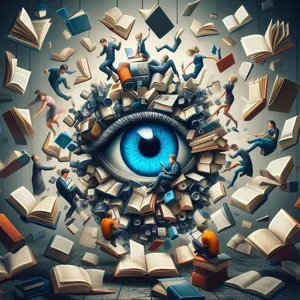
When it comes to the literary world, not every masterpiece receives the acclaim it deserves. Some books, despite their profound insights, compelling narratives, and innovative prose, remain overshadowed by more popular titles. In this section, we’ll explore a selection of the most underrated books—hidden gems that are often overlooked yet hold immense value for readers willing to seek them out.
One such book is “Stoner” by John Williams, a quiet but powerful novel that follows the life of an unassuming college professor whose passion for literature and teaching is met with a series of personal and professional disappointments. Although it was published in 1963 and initially garnered little attention, it has since gained a devoted following for its exquisite prose and deep exploration of the human experience.
Another hidden treasure is “The Master and Margarita” by Mikhail Bulgakov. Written in the 1930s but published posthumously, this novel intertwines a visit from the Devil to Soviet Moscow with a retelling of the trial of Jesus in Jerusalem. Its blend of satire, fantasy, and philosophical inquiry creates a rich tapestry that resonates with readers on multiple levels, yet it remains less known than many other classics.
Lastly, consider “The Wind-Up Bird Chronicle” by Haruki Murakami. While Murakami enjoys a significant fan base, this particular work often gets overshadowed by “Norwegian Wood” or “Kafka on the Shore.” However, its surreal narrative, woven with themes of loss, identity, and the subconscious, presents a unique reading experience that is both haunting and thought-provoking.
These underrated books, along with many others, offer profound insights and unforgettable characters that deserve a place on every reader’s bookshelf. By exploring these literary treasures, you not only enrich your reading experience but also support authors whose voices may not have received the spotlight they truly deserve. So, dive into these hidden gems and rediscover the joy of literature that often flies under the radar.
6. The Case for Underrated Books: Why They Deserve More Attention
In a literary landscape often dominated by bestsellers and critically acclaimed works, underrated books frequently languish in obscurity, waiting patiently for their moment in the spotlight. These hidden gems often offer unique perspectives, innovative storytelling, or profound insights that challenge conventional narratives and resonate deeply with readers. The case for these underrated works is compelling: they not only broaden our understanding of literature but also enrich our cultural tapestry.
Take, for instance, the subtle magic of *The Master and Margarita* by Mikhail Bulgakov. Often overshadowed by other classics, this novel weaves together the fantastical and the political, exploring themes of good and evil with a wit that leaves readers both entertained and contemplative. Its intricate narrative structure and multifaceted characters invite readers to return again and again, revealing new layers and meanings with each read.
Similarly, consider *The Wind-Up Bird Chronicle* by Haruki Murakami. While Murakami has a devoted fan base, many of his works slip under the radar in mainstream literary discussions. This novel, with its surreal blend of reality and dreamscape, offers a haunting exploration of loss, identity, and the quest for connection. It’s a prime example of how underrated books can push boundaries and expand our understanding of what literature can achieve.
The beauty of underrated books lies in their ability to surprise and engage readers in ways that mainstream titles may not. They often reflect the voices of marginalized authors or explore themes that are not widely discussed, making them vital to a more inclusive understanding of literature. By seeking out and championing these works, we not only enrich our own reading experiences but also contribute to a broader literary conversation that values diversity and depth.
In a world where popular opinion can overshadow quieter voices, it’s crucial to take a step back and appreciate the underrated. They remind us that literature is not just about the loudest voices but also about the subtle whispers that can evoke profound emotions and thoughts. So, the next time you reach for a book, consider exploring those that don’t often make the bestseller lists—who knows what treasures you might uncover?
7. Genre-Specific Overrated and Underrated Titles
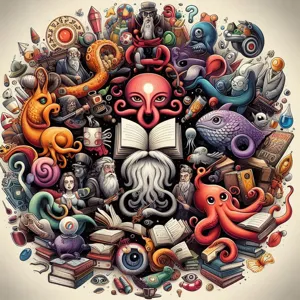
When it comes to the literary world, perceptions of books can vary dramatically across different genres. Certain titles are often hailed as masterpieces, while others, equally deserving of recognition, fall into the shadows of neglect. Understanding these genre-specific overrated and underrated titles can enhance our reading experience and broaden our appreciation for diverse literary voices.
In the realm of **fantasy**, for instance, J.R.R. Tolkien’s *The Lord of the Rings* is frequently celebrated as the gold standard, often overshadowing other remarkable works like N.K. Jemisin’s *The Fifth Season*, which masterfully blends rich world-building with contemporary themes of oppression and resilience. Jemisin’s trilogy has garnered critical acclaim, yet it remains less known among casual readers, illustrating how genre conventions can lead to narrow reading habits.
Similarly, in **romance**, the classic *Pride and Prejudice* by Jane Austen often dominates discussions, frequently relegating lesser-known gems like *The Hating Game* by Sally Thorne to the background. Thorne’s novel offers a refreshing twist on the enemies-to-lovers trope, combining humor and heartfelt moments that resonate with many modern readers. This disparity highlights how enduring classics can eclipse innovative contemporary works that deserve equal attention.
In **science fiction**, Isaac Asimov’s *Foundation* series is widely regarded as a cornerstone of the genre, yet newer voices like Becky Chambers’ *Wayfarers* series provide a profound exploration of human relationships and empathy in a futuristic setting. Chambers’ narrative style and character-driven plots challenge traditional sci-fi tropes, yet still fly under the radar for many genre fans.
By examining these genre-specific overrated and underrated titles, readers can cultivate a more nuanced understanding of literature. Diving into the less conspicuous works not only enriches one’s reading list but also invites a deeper exploration of the themes and narratives that shape our world. As we unpack these literary scales, let’s embrace the hidden gems and challenge the prevailing norms that dictate our reading choices.
8. The Role of Popularity and Cultural Impact in Evaluation
When it comes to evaluating literature, popularity and cultural impact often play pivotal roles in shaping perceptions of a book’s value. The literary landscape is littered with titles that have either soared to iconic status or faded into obscurity, and these dynamics can sometimes obscure the true essence of the work itself. Popularity can create a halo effect, leading readers to assume that widely acclaimed books are inherently superior, while those that lack mainstream attention may be dismissed as lesser works, regardless of their artistic merit.
Consider the phenomenon of “book clubs” and viral bestsellers—titles that dominate the bestseller lists due to a clever marketing strategy or a timely theme. These books often generate significant buzz, prompting discussions and debates that can elevate their status in the literary world. However, this popularity does not always equate to quality. For instance, a book may become a cultural touchstone, widely referenced in media and conversation, yet fail to offer the depth or innovation that truly resonates with discerning readers.
On the other hand, some underrated books possess profound insights and artistic brilliance, yet languish in obscurity due to lack of marketing or the timing of their release. These hidden gems may challenge conventions, offer unique perspectives, or delve into themes that resonate deeply with certain audiences, yet they remain overshadowed by more popular titles. The evaluation of such works requires a thoughtful consideration of the context in which they were published, the cultural conversations they engage with, and the lasting impact they may have on the literary canon.
Ultimately, the interplay between popularity and cultural impact necessitates a nuanced approach to literary evaluation. While a book’s commercial success can provide a glimpse into its societal relevance, it shouldn’t be the sole metric by which we judge its worth. By exploring both the overrated and underrated books through this lens, we can cultivate a more comprehensive understanding of literature’s role in reflecting, challenging, and shaping the human experience.
9. Reader Perception: How Personal Experience Influences Opinions
When it comes to literature, the power of personal experience is profound and often transformative. Each reader approaches a book with a unique set of lenses shaped by their life experiences, cultural background, and emotional states at the time of reading. This subjectivity can dramatically influence how a book is perceived, leading to a spectrum of opinions that can label some works as overrated while others are deemed underrated.
Consider a classic like “The Catcher in the Rye.” For some, Holden Caulfield’s rebellious spirit and existential musings resonate deeply, evoking a sense of nostalgia or understanding that can elevate the book to iconic status. Others, however, may find Holden’s cynicism grating, viewing the novel as a tedious exploration of teenage angst. This disparity illustrates how personal experience can skew perception, transforming a beloved classic into an overrated relic in the eyes of some readers.
Similarly, lesser-known works often receive a fraction of the attention they deserve, simply because they haven’t reached a wider audience. Take “The Master and Margarita,” for instance. For readers who have encountered it during pivotal moments of their lives, the blend of fantasy, romance, and political satire may feel like a hidden gem, bursting with profound insights. Yet, to those who pick it up without the context of its historical significance or cultural resonance, it might come off as overly complex or convoluted—thus relegating it to the status of an underrated masterpiece.
Ultimately, reader perception is a reflection of the intricate dance between the text and the reader’s individual narrative. The same book can evoke joy, frustration, enlightenment, or indifference, all depending on the reader’s journey. This dynamic interplay not only enriches the literary landscape but also reminds us of the beauty of diverse interpretations, urging readers to approach each new book with an open mind, ready to explore the myriad ways literature can speak to the human experience.
10. The Impact of Literary Awards on Overrating and Underrating
Literary awards have a profound influence on how books are perceived and valued, often swinging the pendulum of popularity in unexpected directions. When a novel snags a prestigious award, it often catapults to the forefront of public consciousness, becoming a must-read for many. Titles like “The Goldfinch” or “A Visit from the Goon Squad,” both winners of the Pulitzer Prize, received immediate acclaim and a surge in sales, leading to a collective adoration that sometimes glosses over their shortcomings. This phenomenon can lead to a form of overrating, where the accolades overshadow legitimate critiques, and readers feel pressured to embrace a book simply because it has been anointed by critics or award committees.
Conversely, lesser-known titles that fly under the radar, despite their quality and depth, often face the opposite fate. Books that are beautifully penned yet lack the marketing muscle or critical spotlight of their more celebrated counterparts may fall into obscurity. For instance, novels like “Stoner” by John Williams or “The Master and Margarita” by Mikhail Bulgakov have garnered cult followings years after their original publication, suggesting that the literary world sometimes overlooks deserving gems that don’t bear the weight of an award on their spines.
Moreover, the criteria for literary awards can vary widely, and what resonates with one judging panel might leave another cold. This inconsistency can further complicate the narrative of what is deemed overrated or underrated. The impact of literary awards extends beyond mere recognition; they shape readers’ perceptions, influence book clubs’ selections, and even sway the decisions of bookstore displays. Ultimately, while awards can shine a spotlight on exceptional work, they can also distort the literary landscape, creating a chasm between what is celebrated and what is genuinely deserving of attention. As readers, it’s essential to navigate this terrain thoughtfully, seeking out voices and stories that may not have garnered the accolades they truly deserve.
11. How Trends Affect the Literary Landscape
Trends play a significant role in shaping the literary landscape, often dictating which books capture the public’s imagination and which ones fade into obscurity. Just like in fashion or music, certain themes, styles, and genres rise to prominence, only to be replaced by new ones as tastes evolve. For instance, the rise of dystopian fiction in the 2010s, spurred by bestsellers like “The Hunger Games” and “Divergent,” led to a surge of similar narratives flooding the market. While some of these books offered fresh perspectives, many were criticized for lacking the depth and originality of their predecessors, resulting in a wave of overrated titles.
Conversely, as trends shift, many deserving works become overlooked. Consider the resurgence of literary fiction that focuses on nuanced character development and intricate storytelling, often overshadowed by the more commercialized genres. Books that once garnered critical acclaim might struggle to find readers amidst the latest bestsellers that dominate the charts. This phenomenon can lead to the unjust categorization of certain masterpieces as “underrated” simply because they don’t align with current trends.
Additionally, the impact of social media cannot be understated. Platforms like Instagram and TikTok have given rise to “BookTok,” where viral recommendations can catapult previously unknown titles into the spotlight. However, this can also create a bandwagon effect, where readers flock to specific books without exploring a broader range of literature. As a result, some exceptional works may be relegated to the sidelines, waiting for their moment to shine.
In this ever-evolving landscape, it’s crucial for readers to remain vigilant and discerning, seeking out hidden gems and questioning the hype surrounding trending titles. By doing so, we can create a more balanced literary environment that celebrates both the overrated and the underrated, ensuring that diverse voices and stories continue to thrive.
12. Author Perspectives: Voices from the Literary Community
In the ever-evolving landscape of literature, the opinions of authors themselves provide invaluable insight into what makes a book resonate or fade into obscurity. To gain a deeper understanding of the most overrated and underrated books of all time, we turned to a diverse array of voices from the literary community. These authors, each with their unique backgrounds and styles, shared their perspectives on how certain works have been perceived over the years.
One author noted how a critically acclaimed novel, often lauded as a masterpiece, failed to stand the test of time for many readers. “It’s a classic case of style over substance,” they remarked. “The prose is beautiful, but the story lacks depth. People praise it because it’s ‘supposed’ to be good, not necessarily because it truly resonates with them.” This sentiment echoes a recurring theme among many in the community, who argue that popular opinions can sometimes overshadow more deserving works.
Conversely, when asked about underrated gems, several authors championed lesser-known books that have deeply influenced their own writing. One writer passionately advocated for a forgotten novel from the early 20th century, describing it as “an exploration of the human condition that rivals the greats.” They lamented how its obscurity denies contemporary readers access to a profound narrative that could enrich their understanding of literature and life.
As these authors shared their insights, a tapestry of opinions emerged, revealing the complexities of literary acclaim. It became evident that the conversation around overrated and underrated books is not merely about individual taste but also about cultural significance and the shifting sands of public perception. Their voices remind us that the literary world is rich with nuance, urging readers to explore beyond the mainstream and discover hidden treasures waiting to be uncovered.
13. Revisiting Classics: Are They Overrated or Timeless?
When we talk about classics in literature, we often find ourselves at a crossroads of admiration and skepticism. On one hand, these works have endured the test of time, revered for their profound insights into the human condition, compelling narratives, and innovative styles. On the other hand, a growing segment of readers and critics argue that some of these so-called masterpieces may be overrated, celebrated more for their historical significance than for their actual literary merit.
Take, for instance, *Moby-Dick* by Herman Melville. Often hailed as one of the greatest American novels, its intricate prose and philosophical musings can leave contemporary readers scratching their heads and wondering if the hype is truly warranted. Despite its rich symbolism and exploration of obsession, many argue that Melville’s epic whaling tale is a slog, filled with lengthy digressions that divert from the central narrative. In this light, is *Moby-Dick* a timeless classic, or has it become a victim of literary elitism?
Conversely, we have *Pride and Prejudice* by Jane Austen, a novel that continues to charm readers with its wit, romance, and keen observations of social class. Austen’s work remains celebrated not just for its narrative but for its enduring relevance in discussions of gender roles and societal expectations. Here, one might argue that *Pride and Prejudice* is indeed a timeless classic, its themes resonating with new generations who grapple with the complexities of love and identity.
Then there are the lesser-known classics that have been overshadowed by their more famous counterparts. Works like *The Master and Margarita* by Mikhail Bulgakov or *Their Eyes Were Watching God* by Zora Neale Hurston often languish in obscurity, despite their rich storytelling and profound themes. These books deserve a second look and challenge the notion that only widely recognized titles can be deemed classic.
As we revisit these works, we encourage a nuanced dialogue about what makes a book “classic.” Is it the book’s ability to reflect and shape societal values? Or is it the emotional and intellectual impact it has on its readers? In this exploration, we aim to unpack the layers of each classic, assessing whether they truly stand the test of time or if they are merely relics of a bygone era, revered for reasons that may no longer resonate with today’s audiences. Ultimately, the conversation surrounding classics is essential, inviting us to continually redefine what we consider to be the pillars of literature.
14. Conclusion: Finding Balance in Literary Appreciation
In conclusion, navigating the vast landscape of literature requires a discerning eye and a willingness to embrace both the celebrated and the overlooked. The literary scale is not merely a hierarchy; it’s a reflection of evolving tastes, cultural narratives, and personal experiences. As readers, we often gravitate towards books that are hailed as masterpieces or those that spark intellectual debates, yet we must also remain open to the hidden gems that may not have received the recognition they deserve.
Finding balance in literary appreciation means recognizing that what is considered overrated to one reader may hold profound meaning for another. Conversely, underrated books often house insights that can transform our perspectives, yet they linger in the shadows, waiting for a curious reader to unearth their value. It’s essential to cultivate a diverse reading list that encompasses a range of genres, styles, and voices.
As you embark on your next literary journey, challenge yourself to explore both the titans of literature and the underappreciated authors who deserve a spotlight. Engage in conversations, seek recommendations, and allow your reading habits to be influenced by varying opinions. In doing so, you’ll not only enrich your own understanding of literature but also contribute to the ongoing dialogue about what truly defines a great book. Ultimately, the joy of reading lies in its ability to connect us, provoke thought, and inspire a lifelong love affair with stories—regardless of their standing on the literary scale.
15. Call to Action: Share Your Own Overrated and Underrated Picks!
As we conclude our exploration of the literary landscape, it’s time to turn the spotlight over to you, dear readers! The world of books is vast and varied, and opinions on what constitutes brilliance or banality can be as diverse as the readers themselves. We want to hear from you—what are your picks for the most overrated and underrated books of all time?
Do you find yourself rolling your eyes at a classic that everyone seems to adore, while secretly cherishing a lesser-known gem that deserves more attention? Perhaps there’s a modern bestseller that has garnered praise but left you feeling underwhelmed, or an obscure novel that completely captivated you when you stumbled upon it.
This is your chance to share your insights and opinions! Whether it’s an iconic tome you believe has been undeservedly elevated to classic status, or an unheralded work that tugs at your heartstrings, we invite you to contribute to this engaging conversation. Drop your thoughts in the comments section below or share them on social media using the hashtag #LiteraryScale. Let’s ignite a lively discussion about the books that have shaped our reading experiences, and together, we can uncover hidden treasures and debunk literary myths! Your voice matters in this vibrant literary community—let’s make it heard!
As we conclude our exploration of the literary scale, we’ve ventured beyond the pages of classic and contemporary works to uncover the most overrated and underrated books of all time. Whether you agree or disagree with our assessments, the beauty of literature lies in its subjectivity; every reader’s experience shapes their perception of a book’s value. We encourage you to dive into the titles we’ve discussed, challenge the status quo, and perhaps even discover hidden gems that deserve a place on your bookshelf. As you continue your literary journey, remember to keep an open mind and heart, allowing the power of words to inspire and transform you. Happy reading, and may you always find joy in the stories that resonate with your soul!

